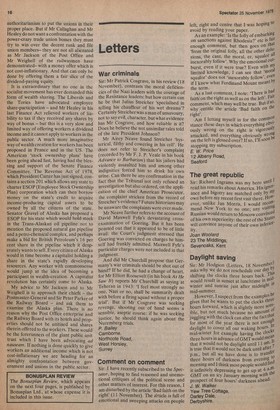War criminals
Sir: Mr Patrick Cosgrave, in his review (18 November), contrasts the moral defieiencies of the Nazi leaders with the courage of the Resistance leaders: but how certain can he be that Julius Streicher 'specialised in telling his chauffeur of his wet dreams'? Certainly Streicher was a man of unsavoury, not to say evil, character, but what evidence has Mr Cosgrave, and how reliable is it? Does he believe the not unsimilar tales told of the late President Johnson?
Mr Airey Neave found Streicher 'hysterical, filthy and cowering in his cell'. He does not refer to Streicher's complaint (recorded by Mr F. J. P. Veale in his book Advance to Barbarism) that his jailers had violently assaulted him and among other indignities forced him to drink his own urine. Can there be any confirmation in the fact that the Tribunal not only refused an investigation but also ordered, on the application of the chief American Prosecutor, the complaint stricken from the record of Streicher's evidence? Future historians may be unaware the complaints were ever made.
Mr Neave further refers to the account of David Maxwell Fyfe's devastating crossexamination of Goering. But it has been pointed out that it appeared to be of little avail: the Court's judgment stressed that Goering was convicted on charges he himself had frankly admitted. Maxwell Fyfe's particular charges were not included in that judgmt. e dn Mr Churchill propose that Germany's war criminals should be shot out of hand? If he did, he had a change of heart, for Mr Elliott Roosevelt (in his book As He Saw It) reports Mr Churchill as saying at Teheran in 1943: 'I feel most strongly no one, Nazi or no, shall be summarily dealt with before a firing squad without a proper trial'. But if Mr Cosgrave was seeking revenge, shooting out of hand seems a sensible, aseptic course: if he was seeking justice, he should think again about the Nuremberg trials.
P. Bailey Cambome, Northcote Road, West Horsley, Surrey


































 Previous page
Previous page